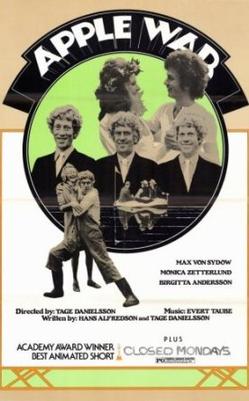
The Apple War is a 1971 Swedish comedy-drama film directed by Tage Danielsson, starring Gösta Ekman, Hans Alfredsson, Tage Danielsson, Monica Zetterlund and Max von Sydow. The political theme of the film is the battle between nature on the one hand and commercialisation and industrialisation on the other set to exploit and ultimately destroy land and natural resources. The film can also be seen as an early criticism of globalisation as it depicts foreign, and large scale, capitalist investors and entrepreneurs as exploiters working side by side with domestic, small scale, capitalists.

The Silence is a 1963 Swedish drama film written and directed by Ingmar Bergman and starring Ingrid Thulin and Gunnel Lindblom. The plot focuses on two sisters, the younger a sensuous woman with a young son, the elder more intellectually oriented and seriously ill, and their tense relationship as they travel toward home through a fictional Central European country on the brink of war.

The Prize is a 1963 American spy film and romantic comedy starring Paul Newman, Elke Sommer, and Edward G. Robinson. It was directed by Mark Robson, produced by Pandro S. Berman and adapted for the screen by Ernest Lehman from the novel The Prize by Irving Wallace. It also features an early score by prolific composer Jerry Goldsmith.
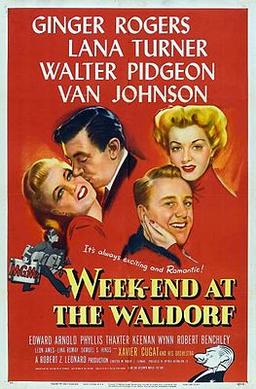
Week-End at the Waldorf, an American comedy drama film starring Ginger Rogers, Lana Turner, Walter Pidgeon, and Van Johnson. Directed by Robert Z. Leonard, its Samuel and Bella Spewack screenplay is based on playwright Guy Bolton's stage adaptation of the 1929 Vicki Baum novel Grand Hotel, which had been filmed as a straight drama as Grand Hotel in 1932.

Princess Anna of Sweden, also known as Anna Maria and Anne Marie, was a Countess Palatine consort of Veldenz by marriage to George John I, Count Palatine of Veldenz. She served as Interim Regent from 1592 to 1598, and supervised the partition of the territories between her sons. She was the daughter of King Gustav I of Sweden and Queen Margaret.

A Woman's Face is a 1941 American drama film noir directed by George Cukor and starring Joan Crawford, Melvyn Douglas and Conrad Veidt. It tells the story of Anna Holm, a facially disfigured blackmailer, who, because of her appearance, despises everyone she encounters. When a plastic surgeon corrects this disfigurement, Anna becomes torn between the hope of starting a new life and a return to her dark past. Most of the film is told in flashbacks as witnesses in a courtroom give their testimonies. The screenplay was written by Donald Ogden Stewart and Elliot Paul, based on the play Il était une fois... by Francis de Croisset. Another version of the story, a Swedish production, was filmed in 1938 as En kvinnas ansikte, starring Ingrid Bergman.
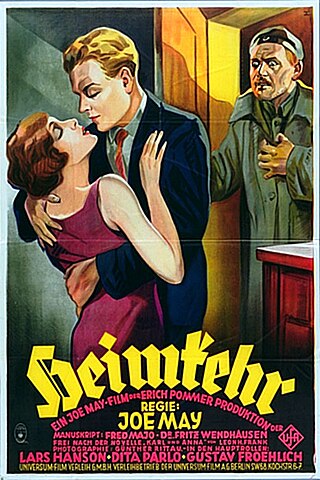
Homecoming is a 1928 German silent war drama film directed by Joe May and starring Lars Hanson, Dita Parlo, and Gustav Fröhlich. A sound version was prepared with the help of Paramount Pictures. While the sound version has no audible dialog, it was released with a synchronized musical score with sound effects using both the sound-on-disc and sound-on-film process. The sound version was more widely exhibited then the silent version due to the general public's apathy to silent films.

Karl Åke Edvard Grönberg was a Swedish film actor who appeared in nearly 100 films. Grönberg was a versatile stage personality of his day, performing as a singer, variety artist, actor, in musical shows and in dramatic productions. He was born in Stockholm, Sweden, and died of a heart attack in 1969.

Barbro Hiort af Ornäs was a Swedish stage and film actress.

Thommy Berggren, né Tommy William Berggren is a Swedish actor. He was a frequent collaborator of director Bo Widerberg, and was primarily active between the early 1960s and mid-2000s.

Elvira Madigan is a 1967 Swedish romantic drama film directed by Bo Widerberg and starring Pia Degermark and Thommy Berggren. It is based on the tragedy of the Danish slackrope dancer Hedvig Jensen, working under the stage name of Elvira Madigan at her stepfather's travelling circus, and her romance with Swedish nobleman lieutenant Sixten Sparre.

A Woman's Face is a 1938 Swedish drama film directed by Gustaf Molander, based on the play Il était une fois... by Francis de Croisset. The cast includes Ingrid Bergman in the lead as a woman criminal with a disfigured face.
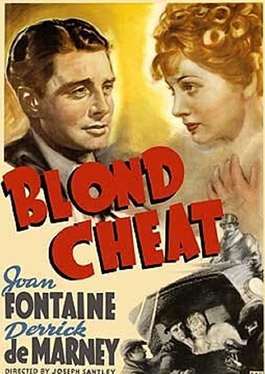
Blond Cheat is a 1938 American romantic comedy film directed by Joseph Santley and starring Joan Fontaine, Derrick De Marney, and Cecil Kellaway. The film was produced by William Sistrom, and originally released by RKO Radio Pictures. The original story is by Aladar Lazlo. The screenplay is by Harry Segall, Charles Kaufman, Paul Yawitz, and Viola Brothers Shore. The tagline for the movie was: "A happy blend of blackmail, robbery, treachery, and love!"

Heja Roland! is a 1966 Swedish comedy film directed by Bo Widerberg. The film won the Guldbagge Award for Best Film and Thommy Berggren won the award for Best Actor at the 3rd Guldbagge Awards.
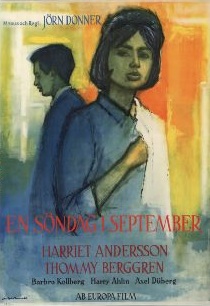
A Sunday in September is a 1963 Swedish drama film directed by Jörn Donner. It is the first feature-length film directed by Donner.
Stall-Erik och snapphanarna is a Swedish film project directed by and starring Anders Olofsson. The narrative is set between 1658 and the early 18th century and tells the story of the snapphanar, a pro-Danish guerrilla movement that fought against Sweden in the 17th century. Olofsson, an amateur filmmaker who works as a cleaner by day, began to shoot the film in 1996. His ability to recruit many established actors, as well as the long production process, has received publicity in several regional and national newspapers. The film was set to be finished in 2020. However, in early 2020, Olofsson set a goal to involve 100 celebrities in the film, and thus revised his estimated completion time to 2025.
Lärarinna på vift is a 1941 Swedish romantic comedy film directed by Börje Larsson, who also wrote the script.

About Endlessness is a 2019 Swedish drama film directed by Roy Andersson. It was selected to compete for the Golden Lion at the 76th Venice International Film Festival. At the Venice Film Festival, the film won the Silver Lion for Best Direction.

The People of Småland is a 1935 Swedish comedy film directed by Gösta Rodin and starring Sigurd Wallén, Sture Lagerwall and Sickan Carlsson. The film was shot at the Råsunda Studios in Stockholm and its sets designed by the art director Arne Åkermark.
















